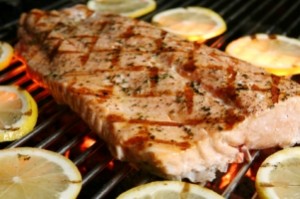 With a summer heat wave affecting most of the country, home cooks are more enthusiastic than ever about recipes that don’t involve turning on the oven or stove. If you’re already tiring of salads, sandwiches and simple grilled chicken, it’s time to look to the sea for some grilling inspiration.
With a summer heat wave affecting most of the country, home cooks are more enthusiastic than ever about recipes that don’t involve turning on the oven or stove. If you’re already tiring of salads, sandwiches and simple grilled chicken, it’s time to look to the sea for some grilling inspiration.
Lauren Salkeld , Senior Editor, Epicurious, likes to keep things simple when she’s preparing or cooking seafood on the grill.
Use healthy oils. Sometimes people perceive fish to be difficult to grill because it falls apart during the cooking process. “Fish often falls apart because it sticks to the grill,” said Salkeld. “Be sure to gently rub or brush fish with oil and you shouldn’t have too much trouble.” To keep your favorite fish figure-friendly, opt for a heart-healthy oil, like canola or olive.
Don’t flip too fast. Once you place your fish on the grill, let it sit undisturbed for a few minutes so it can sear and develop a crust. “If you try to move the fish too soon, the crust won’t be thick enough and will stick to the grill, breaking away from the rest of the fish,” said Salkeld. “It’s tricky to resist the urge to touch or flip fish too early.”
Use grilling baskets. Whole fish are typically easier to grill, but cooking smaller items like shrimp or scallops often leave you with stronger grill flavor. To have the best of both worlds, Salkeld recommends nonstick grilling baskets or foil packets to protect the integrity of your ingredients.
Skewer your seafood. One of the easiest ways to grill shrimp, scallops, and some fish, is by threading them on skewers, allowing you to grill more items at once. You can even make a complete meal out of them by adding bell peppers, onions, zucchini or other fresh summer vegetables. If you’re using wood skewers, be sure to soak them in water before exposing to heat to avoid splintering.
Marinades vs. Rubs. Marinades are an easy, quick way to add a little extra flavor, but fish is usually pretty delicate and only needs about an hour or so. Also, remember that if your marinade includes acid – like citrus juice – it will “cook” the fish, a la ceviche. Rubs typically stand up well to fattier cuts of meat and are excellent with salmon or tuna.
Also Read:
